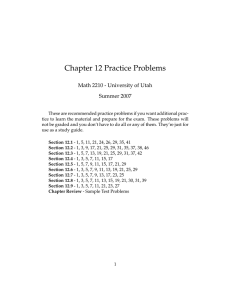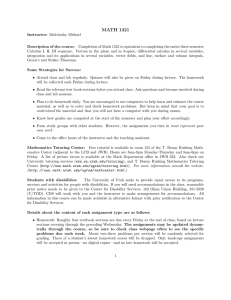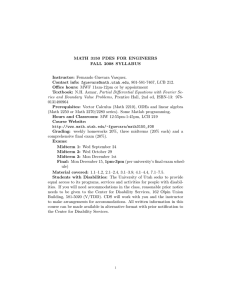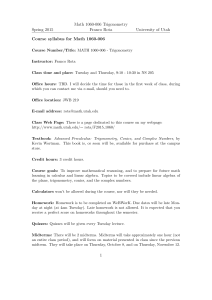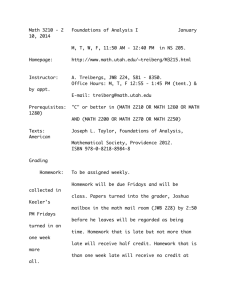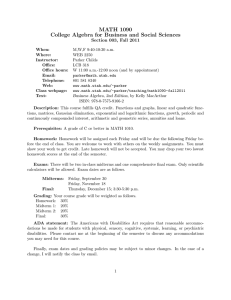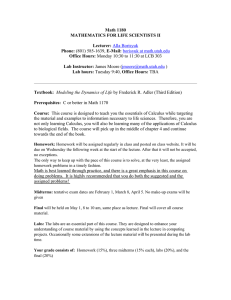Math 1210-019 Spring 2016 Franco Rota University of Utah
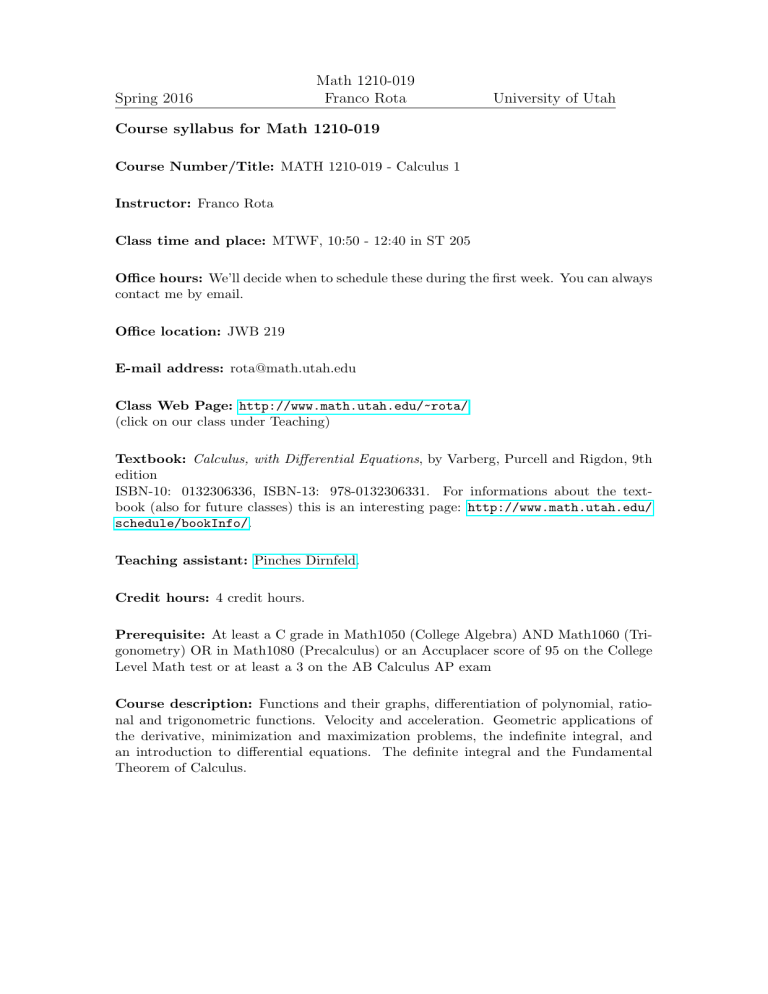
Spring 2016
Math 1210-019
Franco Rota
Course syllabus for Math 1210-019
Course Number/Title: MATH 1210-019 - Calculus 1
University of Utah
Instructor: Franco Rota
Class time and place: MTWF, 10:50 - 12:40 in ST 205
Office hours: We’ll decide when to schedule these during the first week. You can always contact me by email.
Office location: JWB 219
E-mail address: rota@math.utah.edu
Class Web Page: http://www.math.utah.edu/~rota/
(click on our class under Teaching)
Textbook: Calculus, with Differential Equations , by Varberg, Purcell and Rigdon, 9th edition
ISBN-10: 0132306336, ISBN-13: 978-0132306331.
For informations about the textbook (also for future classes) this is an interesting page: http://www.math.utah.edu/ schedule/bookInfo/ .
Teaching assistant: Pinches Dirnfeld.
Credit hours: 4 credit hours.
Prerequisite: At least a C grade in Math1050 (College Algebra) AND Math1060 (Trigonometry) OR in Math1080 (Precalculus) or an Accuplacer score of 95 on the College
Level Math test or at least a 3 on the AB Calculus AP exam
Course description: Functions and their graphs, differentiation of polynomial, rational and trigonometric functions. Velocity and acceleration. Geometric applications of the derivative, minimization and maximization problems, the indefinite integral, and an introduction to differential equations. The definite integral and the Fundamental
Theorem of Calculus.
Spring 2016
Math 1210-019
Franco Rota University of Utah
Expected learning outcomes: Upon successful completion of this course, a student should be able to:
• Take limits of algebraic and trigonometric expressions of the form 0/0 (that simplify), non-zero number over 0, including limits that go to (positive or negative) infinity, limits that don’t exist and limits that are finite.
• Use the limit definitions of derivative and definite integral for polynomial, rational and some trigonometric functions; understand definition of continuity.
• Differentiate all polynomial, rational, radical, and trigonometric functions and compositions of those functions; perform implicit differentiation and compute higher order derivatives.
• Use differentiation to find stationary, singular and inflection points, as well as domain and limit information to determine vertical and horizontal asymptotes, and then use all of that information to sketch the graph of a curve, y = f(x).
• Apply differentiation to optimization and related rates problems.
• Compute indefinite and definite integrals, using the power rule and basic u-substitution and the Fundamental Theorems of Calculus.
• Apply the definite integral to compute area between two curves, volumes of solids of revolutions, arc length, surface area for surfaces of revolution and center of mass.
Tutoring: T. Benny Rushing Mathematics Student Center (adjacent to JWB and LCB),
Room 155, M-Th 8 a.m. - 8 p.m., F 8 a.m. - 6 p.m. (closed Saturdays, Sundays and holydays). They are also offering group tutoring sessions. If you’re interested, visit http://www.math.utah.edu/ugrad/tutoring.html. Alternatively, refer to University
Tutoring Services, 330 SSB (they offer inexpensive tutoring). There is also a list of tutors at the Math Department office in JWB233.
Grading: The grades will be calculated as follows:
Homework 10%
Labs 15%
Midterm 1 20%
Midterm 2 20%
Midterm 3 10%
Final 25%
Spring 2016
Math 1210-019
Franco Rota University of Utah
The midterm that counts for 10% is not necessarily the third: I will consider the worst of your midterms and give it a 10% weight. The other two will count as 25%. Your grades will be posted on Canvas. You can get there easily from the main University of
Utah website www.utah.edu. To log in, you use the same student id and password that you use for Campus Information System. I do my best to update the grades on a regular basis and keep everything accurate. However, I would advise you to check your grades often to make sure there were no data entry mistakes. I’m always happy to correct any mistakes I’ve made. You just need to let me know about them.
Grading scale: The grade scale will be the usual:
A AB+ B BC+
[100 , 93] (93 , 90] (90 , 87] (87 , 83] (83 , 80] (80 , 77]
C CD+ D DE
(77 , 73] (73 , 70] (70 , 67] (67 , 63] (63 , 60] (60 , 0]
Homework: Homework will be assigned weekly and will be collected at the beginning of class each Monday. Most of the homework will be graded by completeness, I’ll pick some problems every week to be graded by correctedness, you won’t know which ones. If you have doubts about the homework we can talk about it after classes or during office hours.
I will accept ten late homework sections, up to two weeks late, throughout the semester for full credit. I will not accept homework more than two weeks late. I accept these late homework sections to allow for illness, oversleeping, etc.. This policy is meant to be flexible enough to cover all reasons and so do not ask for special favors in regards to the homework policy, unless the circumstances are extraordinarily severe.
Midterms: There will be 3 midterms. As explained before, I will take the worst grade and make it count 10%, the others will count 20%. Midterms will take the entirety of one class period, and will focus on material presented in class since the last midterm (or since the beginning of the semester).
Exams: The final exam for this class is comprehensive and it will occur on Tuesday,
May 3, 2016, from 10:30 am to 12:30 pm in the regularly scheduled classroom.
Labs: You are expected to attend a weekly problem session, held by our TA. These will occur on Thursdays. During each of these sessions you will be given a problem set to work on. You will work on the problems in class, with the help of our TA, possibly in groups. The following Thursday he will collect the problem sets, which will then be graded by correctedness. These problems will be harder than the ones assigned as
Spring 2016
Math 1210-019
Franco Rota University of Utah homework, and you are expected to make the most out of the help your TA will provide, in class and during office hours.
Cheating: A first incidence of cheating will result in a score of “0” for the work. A second incidence of cheating will result in a score of “0” for the class . Particularly severe first incidences may count as second incidences and result in a grade of “0” for the class.
I will report all such incidences to the appropriate authorities.
Miscellany:
• No laptops, phones, tablets et cetera allowed during class. If you desperately need to send an e-mail, send a text, or make a phone call, feel free to step out of the classroom for as long as you need to. You are allowed to bring a scientific calculator, but not a programmable or graphing one. You can still use this to do your homework if you want, but since they won’t be allowed on midterms and on the final, it might not be a good idea to do so.
• there’s a chance calculators won’t be allowed for midterms. We’ll decide that time by time.
• In the absence of extenuating circumstances, there will be no “make-ups” or
“retakes” of any course material.
• Because this section meets during what many consider to be lunch time, students may want to eat some food during class.
Please don’t . This is needlessly distracting to you, your classmates, and myself.
• If you believe that I made a grading mistake, come talk to me prior to one week after I had handed the assignment or exam back. No revisions or adjustments will be made after this time.
• I reserve the right to make a change in course policy—this syllabus is not a binding document. If a change is needed, I will announce the change to the class and send a class-wide e-mail.
• Working on homework problems in a group is a great way to learn mathematics!
Sharing and copying answers verbatim is cheating, however. If you prefer to work in a group, great! Talk about the problems as much as you like, but please write up your own solutions.
ADA statement: The University of Utah seeks to provide equal access to its programs, services and activities for people with disabilities. If you will need accommodations in the class, reasonable prior notice needs to be given to the Center for Disability Services,
162 Olpin Union Building, 581-5020 (V/TDD). CDS will work with you and the instructor to make arrangements for accommodations. All information in this course can be
Spring 2016
Math 1210-019
Franco Rota University of Utah made available in alternative format with prior notification to the Center for Disability
Services.
Student responsibilities: All students are expected to maintain professional behavior in the classroom setting, according to the Student Code, spelled out in the Student
Handbook. You have specific rights in the classroom as detailed in Article III of the
Code. The Code also specifies proscribed conduct (Article XI) that involves cheating on tests, collusion, fraud, theft, etc. Students should read the Code carefully and know you are responsible for the content. According to Faculty Rules and Regulations, it is the faculty responsibility to enforce responsible classroom behaviors, beginning with verbal warnings and progressing to dismissal from class and a failing grade. Students have the right to appeal such action to the Student Behavior Committee.
Important Dates :
Drop Deadline . . . . . . . . . . . . . . . . . . . . . . . . . . . . . . . . . . . . . . . . . Friday, January 22
First Midterm . . . . . . . . . . . . . . . . . . . . . . . . . . . . . . . . . . . . . . . Monday, February 1
Second Midterm . . . . . . . . . . . . . . . . . . . . . . . . . . . . . . . . . . . . . . Friday, February 26
Withdraw Deadline . . . . . . . . . . . . . . . . . . . . . . . . . . . . . . . . . . . . . . . Friday, March 4
Third Midterm . . . . . . . . . . . . . . . . . . . . . . . . . . . . . . . . . . . . . . . . . Monday, April 11
Course Final . . . . . . . . . . . . . . . . . . . . . . . . . . . . . . . . . . . . . . . . . . . . . Tuesday, May 3
